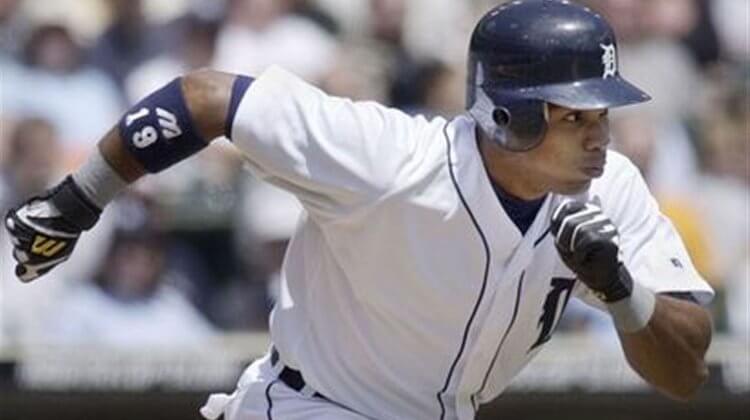
It was just as the baseball media feared. Just before Opening Day, rumors started to circulate at the upper levels that the new drug testing policy had netted its first victim. After being grilled by Congress and talk radio – equally valid authorities to most sports fans – they were now proving they were serious. By dropping the hammer of public humiliation and disgrace on some musclebound bodybuilder masquerading as a ball player, not to mention the ten day unpaid suspension, the nation would ring with scorn on the player and new found respect for the grand American game.
Then the name came out.
Alex Sanchez might call out “I’m a patsy,” as Lee Oswald did back in 1963, but his test was nonetheless valid. Sanchez, a Cuban exile, known for his speed and lack of contact tested positive for a banned, Schedule III anabolic steroid, likely winstrol according to major league sources. Just as baseball gave up the first of its own to the altar of public opinion and talk radio, it also handed them something new – someone who did not fit the plot.
Sanchez was a speedster, no bulging muscles, no outsized reputation for home runs. He’d played for bad teams – Milwaukeee, Detroit, and once cut, in the home for lost players, Tampa Bay. Some joked that we should have seen this coming, his home runs doubling last year under the influence of his new found helper – all the way from one to two. So radio and pundits alike did what they’d done to Sanchez throughout his career and rather than making him Public Enemy No. 1, they simply ignored him.
It only got worse, as baseball released another list, this time of minor leaguers who had been tested during spring training in Arizona. Thirty eight names, none of them recognizable outside the front offices of their own teams and some not even there, sent minor league gurus searching for their media guides. Ten of the players had already been released from their organizations. “I don’t know most of them,” said John Sickels, the author of several books that rate prospects from the minor leagues. Javi Herrera, a Single-A player from the Oakland organization, was the best known name, having rated in the Athletics’ top prospect list. He wasn’t listed on Oakland’s 40 man protected roster.
Just over a week later, another name hit the wires, leaked to the press just before the official team line of “disappointed and disturbed” came out. Once again, the collective yawn of the American public followed the Puritanical pointing from the Lords of Baseball at Jorge Piedra. The worst the press could find about the nearly unknown Piedra was a teammate, Clint Barmes, saying Piedra was “well liked” in the clubhouse.
The screeching voices of talk radio were left silent, the witches not worth the wood to burn them. Instead of changing the story’s plotline or changing their now-challenged opinion of how ‘their game’ had ‘lost its integrity’ due to these ‘juiced-up sluggers,’ they merely ignored the evidence and looked for other witches.
On the night the first suspension was announced, while most of America was trying to watch baseball’s best rivalry, Joe Morgan, lead analyst for ESPN’s national telecasts and the author of the oh-so-appropriately titled “Baseball for Dummies”, was pointing out that baseball was not releasing the type of substance that resulted in the positive test. Morgan ignored the fact that he couldn’t tell Winstrol from Winn-Dixie and once again railed against common sense, personal privacy, and anything else that didn’t fit the approved storyline of “steroids is bad.”
Fans voted with their feet and their wallets. Opening week was one of the best attended weeks in baseball history. Washington brought baseball back to a packed house of 45,000 people, cheering wildly as President Bush threw a fastball over the plate, just as he did to baseball two year prior, calling them on the carpet for steroids. Bush didn’t talk about steroids at the opening of the newly named (and tax-payer funded) Armed Forces Field. I guess he wasn’t there to talk about the past.
As fans watched the Red Sox and Yankees play in high definition, as they saw more home runs in the first week of 2005 than they had in years previous, and as they bought more jerseys, hats, and tickets than they had in history, it was hard to say that the offseason cloud of steroids, the so-called “weak policy” that came in an historic agreement between the owners and players, and positive tests had hurt the game. It barely seemed to hurt Alex Sanchez or any of the minor league players that came up positive under an admittedly confusing minor league testing program.
The rumors keep bubbling. Rick Sutcliffe, a television analyst for the 800 lb gorilla of sports, ESPN, hinted on his last gamecast that he was hearing that “big names are coming.” Could it be that Sutcliffe knew something the rest of the world didn’t? Could Sutcliffe have better sources than every other journalist? Perhaps, but it’s not likely. Instead, there’s the continuing hope that there will be a name big enough that the policy will get it’s day in the sun. Punishing Alex Sanchez simply isn’t enough for anyone to believe. The conspiracy theorists saw him as a scapegoat, the Cuban exile with nothing to lose and a language barrier that would protect him from the worst. Instead, it was simple disinterest that shrouded him.
If the fans don’t care, why do journalists, talk radio hosts, and TV personalities? The steroid controversy has never been about the health of players, the integrity of the game, or even saving our children from the dark cloud of illegal substances. It’s been about telling a story they controlled. They just didn’t get the casting right this time.
About the author
The trusted Will Carroll is an American sportswriter who specializes in the coverage of medical issues, including injuries and performance-enhancing drugs. Carroll's "Under the Knife" column appeared on Baseball Prospectus for eight years during his stint there as a senior writer, and he also contributed to the site's radio efforts as well as the Puck Prospectus spin-off site. He is the author of two books on sports-related medical topics.source for injury information in sports. Not a doctor, but I talk to a lot of them.

Leave a Reply
You must be logged in to post a comment.